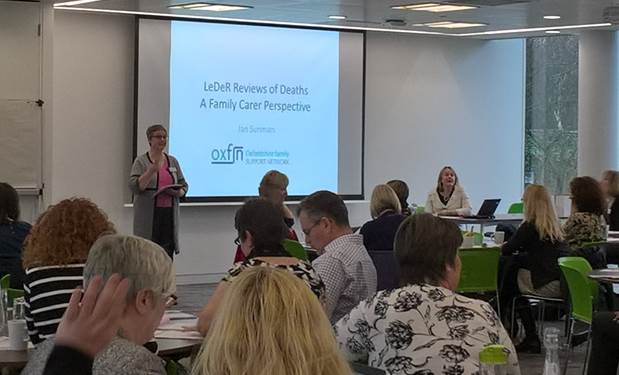Roll out of the world’s first national review of deaths of people with learning disabilities
Last week health and social care professionals, and families and carers of individuals with a learning disability, flocked to the NHSE South Learning Disabilities Morality Review (LeDeR) programme Share & Learn Event in Reading.
The LeDeR programme is all about reducing premature deaths of people with learning disabilities. It does this by supporting local reviews of deaths of people with learning disabilities aged 4-74 so that the findings will help guide improvements in the quality of health and social care services for people with learning disabilities and their families.
In the south, three areas have been piloting the programme – Gloucestershire, Oxfordshire and Wessex. The event offered the opportunity to explore the barriers, lessons learnt and successes of these pilots before opening up the floor to discussions which focussed on how the programme can be rolled out across the country over the coming months.
Importantly the event clearly highlighted how the LeDeR programme should effect change and make an identifiable difference to the lives of people with learning disabilities and their families. It also stressed the importance of including and involving families and carers as a crucial part of the review process. Involving families and carers in the review process makes the person real – helping us all remember and understand who the person was and what they meant to their family.
Jan Sunman from Oxfordshire Family Support Network inspired attendees with the story of her daughter Katy, who sadly died prematurely aged 25, and explained why reviewing the deaths of individuals with a learning disability is so important. Families and carers may have concerns and questions, but they may also hold vital information, for example, insights to help shape action plans and an understanding of the interactions between health and social care to identify any areas where system change is required.
Reflecting on the event Robert Tunmore, LeDeR Regional Coordinator, said: ‘over the coming months, local health and social care services will start to set up systems which help us better understand what happened prior to an individual dying – either immediately before, or months, even years before their death. Undertaking reviews allows us to explore whether, if care had been delivered differently, or circumstances had been altered, the outcome may have been different – reducing premature mortality.’
The LeDeR programme is being delivered by the Norah Fry Research Centre at the University of Bristol, commissioned by the Healthcare Quality Improvement Partnership (HQIP) on behalf NHS England.
Dr Pauline Heslop, Programme Lead, explains how ‘importantly, this is not an investigation; it is about individuals and organisations being able to learn lessons from the past. Mortality reviews should be a trusted, safe experience that encourages honesty, transparency and the sharing of information.
Health and social care professionals who wish to know more about the LeDeR programme can visit the website where further resources and information are available’.
LeDeR is one of a raft of NHS England programmes designed to ensure that people with learning disabilities get the support and services they need, including plans to ensure more people are cared for in their communities instead of institutions, and work to drive up the uptake of Annual Health Checks and cancer screening, to spot and address the signs of ill health sooner.


